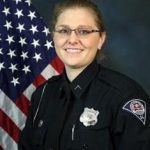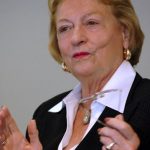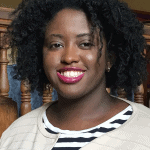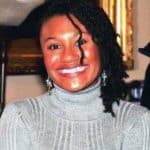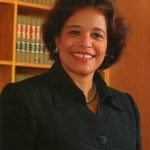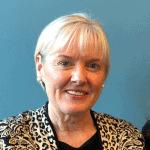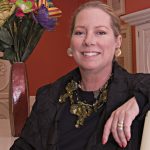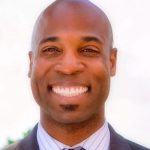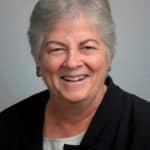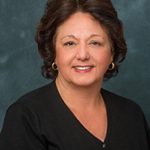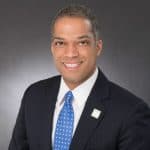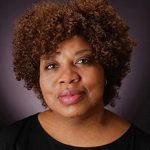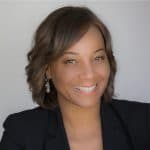Nadia Saah ’12 is a property manager at Boston Properties. She says that every day she draws on her Trinity master of arts degree in communication to ensure her clients are confident that they are up-to-date with the operations of the facility in which their offices reside.
At Boston Properties, A Master Communicator Puts A Trinity Degree To Work
 Back in 2009, Nadia Saah had a bachelor degree’s and a couple of prestigious newsroom internships under her belt — but the economic collapse of 2008 and the lingering Great Recession meant journalism jobs were scarce, even in the nation’s capital. Saah decided to put her media-maven plans on pause and pursue an advanced degree at Trinity, both to add some graduate-degree polish to her résumé and to defer the day she’d have to start repaying student loans.
Back in 2009, Nadia Saah had a bachelor degree’s and a couple of prestigious newsroom internships under her belt — but the economic collapse of 2008 and the lingering Great Recession meant journalism jobs were scarce, even in the nation’s capital. Saah decided to put her media-maven plans on pause and pursue an advanced degree at Trinity, both to add some graduate-degree polish to her résumé and to defer the day she’d have to start repaying student loans.
Eleven years later, the media industry continues to contract. But the skills and the savvy Saah picked up at Trinity as part of her Communication degree laid the foundation for her current career keeping more than 500 office-building occupants in the know. She’s a Chevy Chase-based property manager for Boston Properties, a national real-estate powerhouse that owns and manages 47 million square feet of office space across the United States. And it wasn’t an accident that she ended up there.
“I was hired for this position, specifically, because I excel at communication,” Saah says. She laughs.
“Especially when it comes to delivering bad news in a way that won’t freak everybody out.” Saah talked to Trinity earlier this year about what sets a great strategic communicator apart, and how she keeps growing in her job using the tools and tactics she learned from Trinity’s faculty.
At Boston Properties, Big Players Means Bringing Her ‘A’ Game
“It’s a public company, a nationwide public company. We own and manage properties in the
D.C. region, Chicago region, Boston of course, New York, and Los Angeles. Here in Chevy
Chase, we oversee 300,000 square feet of office space.
“Microsoft is a huge tenant here. And Pacific West Bank — those are the two anchor tenants.
And at my last job, the anchor tenant was the Consumer Product Safety Commission.
“So if you think about where you work — who’s the person you go to if you need to complain?
That’s me. My old boss put it simply: We’re here to solve problems for people in the building.
“I was hired for this position, specifically, because I excel with communication. Communicating
with tenants, communicating with contractors. A lot of my job is figuring out the right way to relay
messages — [especially] delivering bad news in a way that won’t freak everybody out.
“If the power were to go out, for example, my job is to keep everybody informed along the way
until it’s restored. If I can find out why it happened, I need to say. If I can find the ETA to get it
done, I can say, ‘Here’s what we’ve been told; I’m sorry, it’s gonna take another day. Please
plan to do X, Y and Z.’ Or ‘You need to implement your emergency office operation.’
“So I think crisis communications is relevant to this position, because sometimes you have to
say things in a way that won’t create hysteria and make the company look bad.”
‘You Learn How You Can Turn A Situation Around’
“The class I was most fond of was Holly Harrington’s class. That was really helpful, and I still
have textbooks that I refer to. … I keep them because they’re resources where I will remember
what Holly said in conjunction with what I’m reading in the book. Writing speeches was a huge
thing—I loved that. She’d give us different scenarios where we’d have to consider our audience,
who’s hearing the speech, and what we’re trying to do with the speech.
“I love to write. My whole career, I intended to be some kind of a writer, be it with USA TODAY
or some kind of PR firm, [but] I was not used to this kind of writing. I was not used to persuasive
speeches. I learned that the words that you use, the more interesting you make them—you
really do get your point across, and you learn how you can turn a situation around.
“In my role, sometimes you just have to be direct and give someone the facts, and it’s gonna
suck. And you’re gonna get people who are really upset. Knowing how to speak to someone
who’s already upset or has very strong feelings about something—some of it’s a
customer-service thing, and some of it’s thinking about what you’re going to say. So Holly’s
class was very helpful; she zeroed in on a specific form of communication.”
‘It’ll Always Help To Have That Knowledge, To Have That Degree’
“I graduated with my bachelor’s degree in 2009, which meant I had zero prospects for jobs. That
was when everything went crazy — it was such a bad recession that I was having a hard time
paying student loans. … I interned for USA TODAY and The Washington Post … and I wanted
to work in the media, [but] they were furloughing people. The advice I got was, Well you like
media —maybe PR ? You can still find what you’re looking for in a similar field. So I thought a
masters in communications would afford me diverse-enough options to choose from, whether it
be in PR or whether I did get something in the media. It’s never going to hurt me. It’ll always
help to have that knowledge, to have that degree on my résumé. And hopefully I get inspired by
the classes, and I zero in on a field.
“And what I liked about Trinity was I could still work full time and go at night to class. It was very
attractive, because it was something I could commute to easily. [And] if I went to American
University, Georgetown, GW, I would have had double the amount of student loans. Certainly
that was a great factor — [a Trinity degree] got me to my goal, and it fit better with my financial
situation. I felt at the time it would be an investment in my future.
“In this area, you have to have a college degree, but you stand out more with a graduate degree
of some sort. The timing just made sense for me—and when people look at my resume, when
people ask me about my background, saying that I have a masters in communication and that I
got it at the age of 25 is a big deal. ”
 Back in 2009, Nadia Saah had a bachelor degree’s and a couple of prestigious newsroom internships under her belt — but the economic collapse of 2008 and the lingering Great Recession meant journalism jobs were scarce, even in the nation’s capital. Saah decided to put her media-maven plans on pause and pursue an advanced degree at Trinity, both to add some graduate-degree polish to her résumé and to defer the day she’d have to start repaying student loans.
Back in 2009, Nadia Saah had a bachelor degree’s and a couple of prestigious newsroom internships under her belt — but the economic collapse of 2008 and the lingering Great Recession meant journalism jobs were scarce, even in the nation’s capital. Saah decided to put her media-maven plans on pause and pursue an advanced degree at Trinity, both to add some graduate-degree polish to her résumé and to defer the day she’d have to start repaying student loans.







